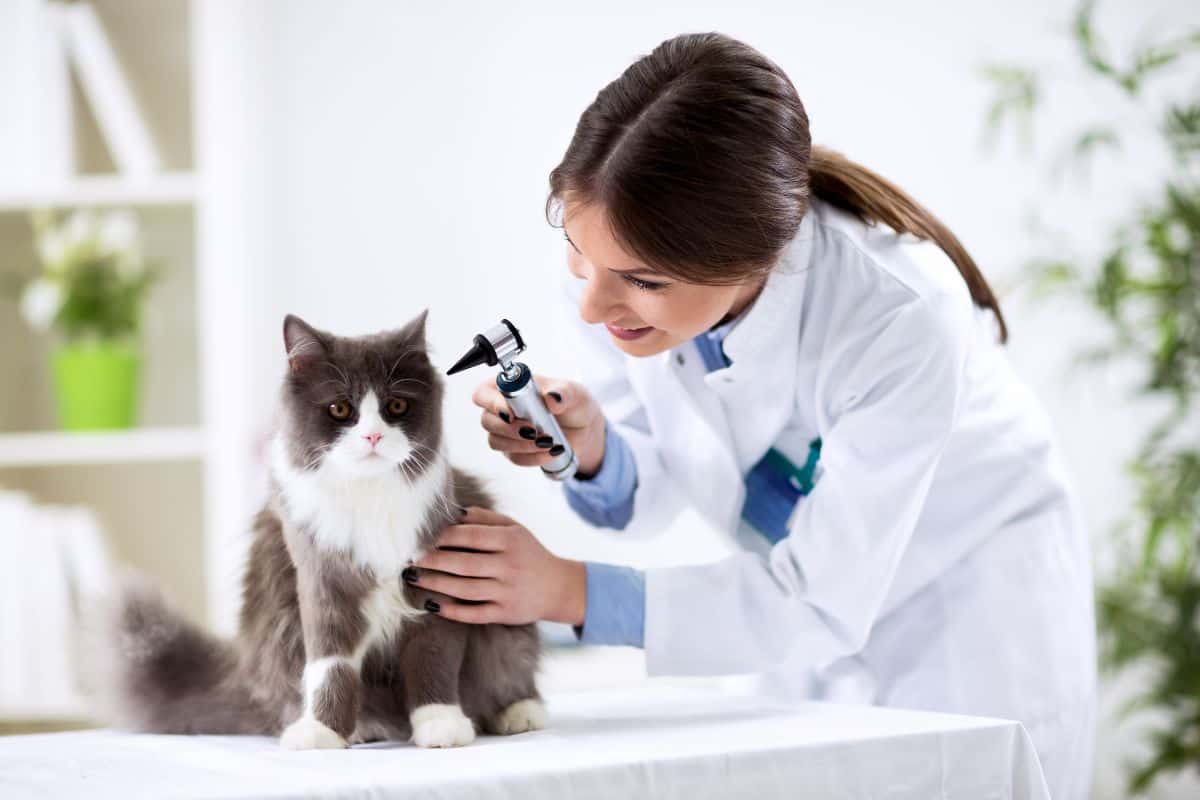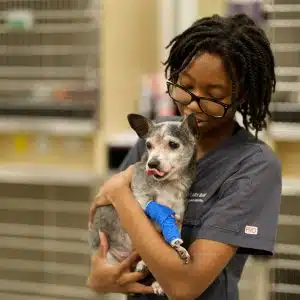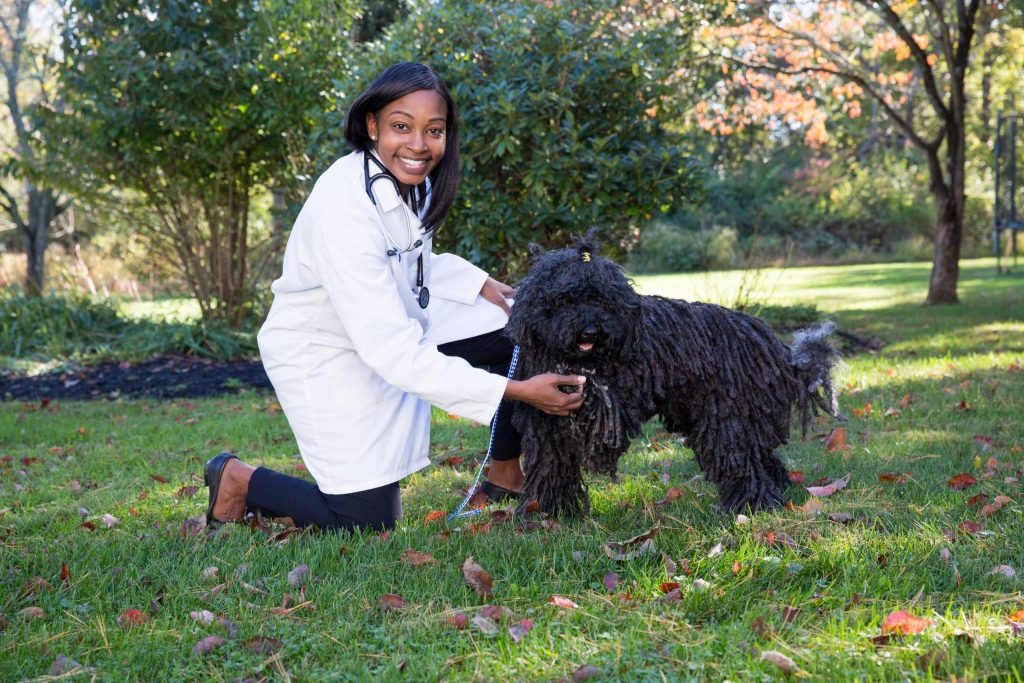Recognizing the Duty of a Veterinary Oncologist in Your Animal's Cancer cells Care
A veterinary oncologist focuses on dealing with and detecting cancer in pets. Their knowledge is important for creating individualized treatment plans that attend to the one-of-a-kind demands of each pet dog. Early medical diagnosis can greatly impact outcomes, making their duty a lot more critical. Understanding the various therapy options and how these specialists collaborate with key veterinarians is important. What methods do they employ to boost your pet dog's high quality of life during this challenging time?

What Is a Veterinary Oncologist?
A veterinary oncologist is a specialized veterinarian that concentrates on treating and detecting cancer cells in family pets. These specialists have sophisticated training in both veterinary medication and oncology, allowing them to comprehend the complexities of malignant illness in animals. Their experience enables them to execute a selection of diagnostic treatments, including imaging strategies and lab tests, to properly identify various types of cancers cells in family pets.
In addition to medical diagnosis, vet oncologists establish customized treatment strategies, which may consist of surgery, chemotherapy, radiation treatment, or palliative treatment. They work carefully with pet dog owners to describe treatment options and potential end results, ensuring that families make informed decisions concerning their pets' treatment. Veterinary oncologists frequently collaborate with other basic professionals and veterinary professionals, producing a comprehensive approach to pet dog health. By focusing on cancer care, they play a vital function in enhancing the high quality of life for family pets detected with hatreds.
The Relevance of Very Early Medical Diagnosis and Therapy
Early diagnosis and treatment of cancer in pets considerably improve the opportunities of effective outcomes and enhanced quality of life. Veterinary oncologists can apply targeted treatments that may slow condition development and alleviate signs and symptoms when cancer cells is recognized in its early stages. This proactive approach enables far better administration of the disease, possibly causing longer survival times and improved convenience for the family pet.
Additionally, very early detection often suggests that treatment alternatives might be less invasive and much more effective, lowering the general burden on both the family pet and its owner. Regular veterinary examinations and recognition of subtle behavior adjustments are essential, as they can assist in prompt diagnoses. Owners need to stay vigilant and consult their veterinarian at the very first sign of issue. Veterinary Oncologist. Ultimately, an early diagnosis empowers animal proprietors to make informed decisions regarding their animal's treatment, substantially impacting the general trip via cancer cells management
Treatment Choices Used by Vet Oncologists
When confronted with a cancer cells medical diagnosis, pet dog proprietors can explore a variety of treatment options offered by veterinary oncologists that are tailored to the particular requirements of their animals. These experts commonly supply a mix of surgery, radiation treatment, radiation treatment, and immunotherapy. Surgical treatment may aim to eliminate growths or impacted tissues, while chemotherapy makes use of medicines to eliminate and target cancer cells, typically administered in cycles.
Radiation treatment focuses on utilizing high-energy rays to minimize and shrink lumps discomfort. Immunotherapy, a much more recent development, harnesses the pet's body immune system to eliminate cancer cells better. Added helpful therapies, such as discomfort administration, dietary assistance, and palliative care, are additionally necessary elements of an extensive treatment strategy. By evaluating each instance separately, vet oncologists ensure that the picked treatment straightens with the family pet's overall wellness and cancer kind, making best use of the possibilities of a favorable result.
The Collaborative Approach: Functioning With Your Primary Veterinarian
Cooperation between primary veterinarians and vet oncologists is essential for providing extensive like pet dogs detected with go to the website cancer. This partnership assures a detailed method to therapy, combining the specialized understanding of oncologists with the recurring care supplied by key veterinarians. With each other, they evaluate the family pet's health, establish customized therapy plans, and check the animal's progress throughout the cancer cells trip.
Main veterinarians usually work as the initial point of get in touch with, recognizing possible indicators of cancer and referring individuals to oncologists for specialized diagnostics and therapy options. Complying with the oncologist's referrals, the main veterinarian plays a crucial function in taking care of the pet dog's overall health, consisting of pain administration and helpful care.
Efficient communication between these professionals fosters a unified technique, enabling for timely interventions and adjustments to treatment as needed. This joint strategy eventually improves the quality of treatment and assistance for animals and their owners throughout a difficult time.


Sustaining Your Animal Via Cancer Treatment
Supporting a pet dog with cancer treatment requires a comprehensive understanding of the physical and psychological challenges encountered by both the animal and its owner. Caretakers should be conscientious to the family pet's altering demands, which might consist of handling discomfort, adjusting diets, and keeping an eye on side effects from therapies. Providing a comfy, stress-free atmosphere is important for the family pet's well-being.
Emotional assistance is equally essential; proprietors should seek to continue to be positive and engaged while being mindful of their own feelings of anxiousness and despair. Developing a support network, including veterinarians, family members, and buddies, can reduce some best site burdens.
Furthermore, family pet proprietors need to educate themselves about the certain kind of cancer and treatment choices readily available, cultivating informed discussions with veterinary oncologists. Inevitably, a compassionate approach, combined with proactive treatment and support, can improve the pet dog's lifestyle during this challenging trip.
Regularly Asked Questions
How Do I Pick the Right Veterinary Oncologist for My Pet dog?
Selecting the right vet oncologist involves looking into certifications, looking for suggestions, evaluating experience with certain cancers, assessing communication designs, and visiting centers to assure a comfortable environment for both the family pet and proprietor during treatment.
What Should I Expect Throughout the First Appointment?
During the initial appointment, the animal proprietor can expect a thorough assessment, conversation of case history, analysis examinations, and a treatment plan synopsis. The vet will attend to problems and provide assistance for recurring care.
Are There Any Type Of Prices Related To a Veterinary Oncologist's Solutions?
Prices related to a veterinary oncologist's solutions can differ substantially based on place, therapy complexity, and needed diagnostics. Veterinary Oncologist. Pet owners should expect costs for examinations, tests, and prospective recurring treatment plans customized to their pet dogs' demands

Can My Pet Dog Still Receive Routine Vet Care While Seeing an Oncologist?
Animals can get regular vet care while seeing an oncologist. Collaborating treatments guarantees extensive health and wellness management. Regular examinations enhance specialized cancer care, permitting for alternative tracking of the animal's overall health and resolving various other health and wellness concerns.
What Resources Are Readily Available for Family Pet Owners During Their Family pet's Cancer Journey?
Various sources are readily available for family pet owners steering their animal's cancer trip, including assistance groups, online discussion forums, academic websites, and economic support programs, all targeted at offering guidance, emotional assistance, and useful information during this tough time.
A veterinary oncologist is a specialized vet who concentrates on identifying and dealing with cancer in pet dogs. They work closely with pet dog owners to explain therapy choices and prospective end results, guaranteeing that family members make educated decisions about their pet dogs' treatment. When faced with a cancer official source cells diagnosis, family pet proprietors can explore a variety of treatment alternatives offered by vet oncologists that are customized to the details demands of their animals. Partnership in between vet oncologists and key veterinarians is crucial for giving comprehensive care to family pets detected with cancer. Additionally, family pet proprietors need to educate themselves about the particular kind of cancer cells and therapy alternatives available, promoting notified conversations with veterinary oncologists.